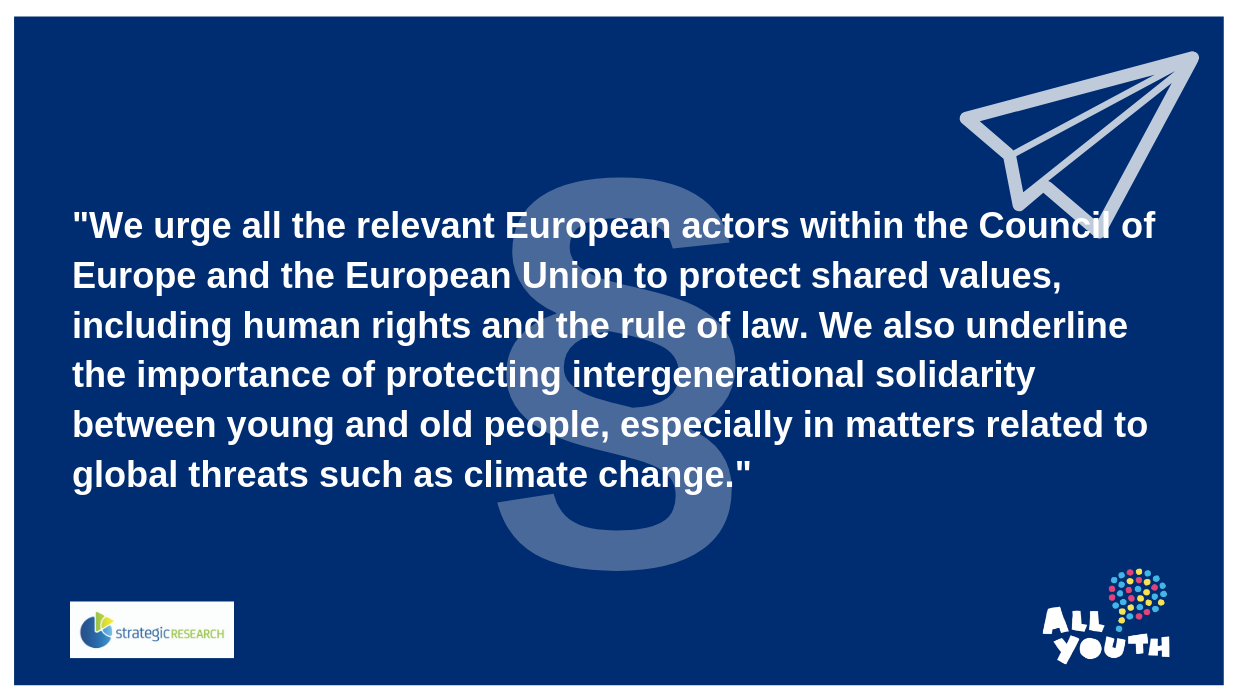Presented at The Rule of Law 2019 -conference February 5th. Masterclass was held February 4th and participants produced recommendations in small working groups.
Recommendations
Download Recommendations (PDF)
We urge all the relevant European actors within the Council of Europe and the European Union to protect shared values, including human rights and the rule of law. We also underline the importance of protecting intergenerational solidarity between young and old people, especially in matters related to global threats such as climate change.
Rule of Law
1. We found that the rule of law definitions are currently sufficiently congruent and not contradictory. However, we draw attention to the strong relationship between human rights law and the rule of law. We urge the Council of Europe and the EU to initiate a dialogue on the rule of law, so that the EU can adapt and acknowledge a stronger human rights basis and connection to the rule of law.
2. Climate change is a rule of law issue. Currently there is an increasing trend for climate change litigation and discussion on the role of courts and states. Our message to the European Court of Human Rights is that the court should not hesitate to use its powers to protect human rights also in times of climate crisis. Protection of human rights, such as the right to life requires protection from the implications of climate change.
3. We also call for the Council of Europe to set in motion a process to establish a specific mechanism to deal with climate change, including a special rapporteur, commission or other watch dog mechanism to enable independent and available country specific information on climate change as well as monitoring.
4. We moreover acknowledge the importance of the impartiality and independence of the judiciary in safeguarding the rule of law and maintaining public confidence in the judiciary. Consequently, we encourage judges to report transparently in case of eny any threats or harassment. In addition, there is a need for institutional support and a mechanism through which judges can report.
Youth Participation
1. We ask the Council of Europe to put in place the necessary means, including financial support, to “teach the teachers” about new methodologies that allow young people to learn to play a meaningful part in society. These new methodologies should focus on multicultural learning.
2. We suggest that the Council of Europe recommend the participation of civil society organizations, academia, and activists at different levels of the education system to provide space and opportunities for interaction and dialogue.
3. We strongly encourage the Council of Europe to foster the creation of youth networks, beginning at an early age, by providing new oppportunities for
international exchanges and interactions. These should facilitate both digital interaction and real mobility of young people in the CoE countries.
4. We request the Council of Europe to prepare and disseminate empowering information and tools on active citizenship, so that schools, teachers, NGOs and young people can be empowered and their capacity-building guaranteed.
Recommendations of the division of labor (UN/EU/CoE)
1. Various organizations are in a position to to complement each other and strengthen human rights. The UN, EU & Council of Europe have their designated objectives but we feel they need to clarify their own idea and focus – and to convey this idea unequivocally to the citizens. The various human rights instruments should complement each other, and also needs to be operationalized.
2. The organizations should clearly communicate their ideas and possibilities for an individual on their working website. Websites should be tested on different social groups and be accessible to all.
3. Civil society organizations should have the opportunity to get foreign finance to ensure the continuation of their work.
Racism, Intolerance and Hate Speech
1. Extensive discussion on the definition of hate speech should be encouraged and responsibility of individuals emphasized. Availability of non-commercial media should be increased and public broadcasting companies should create plain language news.
2. A more comprehensive approach is needed to education in media literacy, hate speech recognition and emotional intelligence. The Council of Europe should provide media-critical training in approaching racist content and fake news. Training should be provided for reporters and journalists but also for students in general in schools and universities. The KiVa Koulu system should be extended further to European level – not only for young people, but also for parents and teachers
3. People should be encouraged to find out how diverse their heritage really is.
